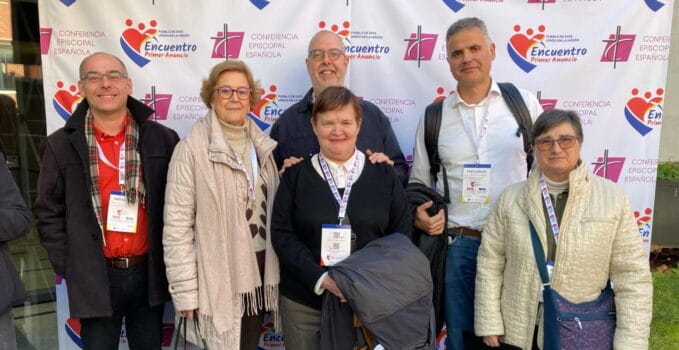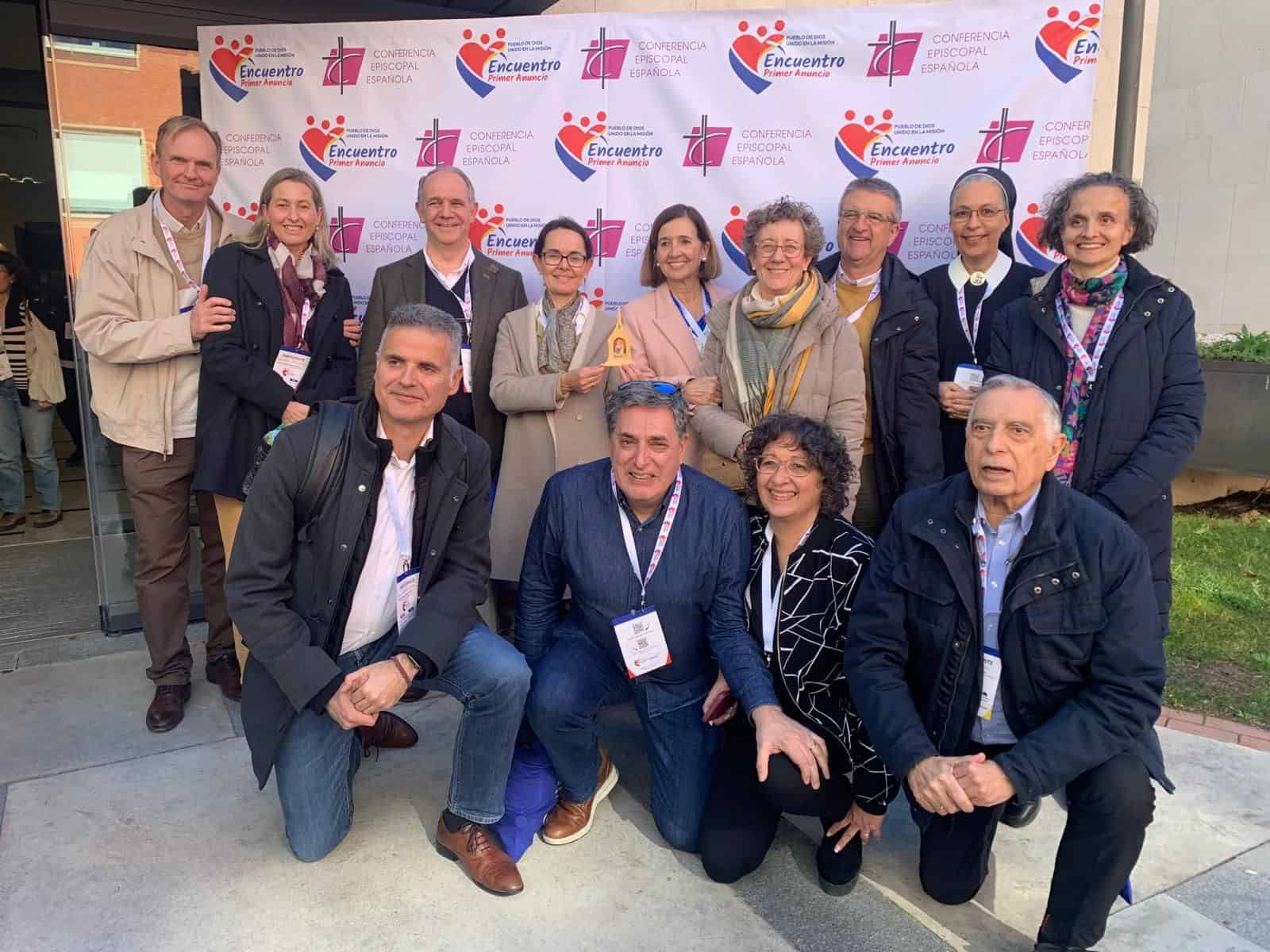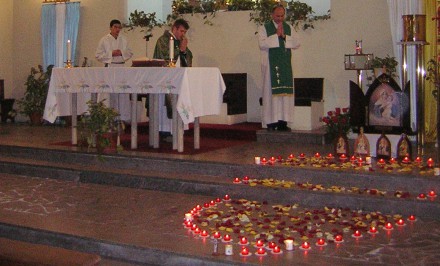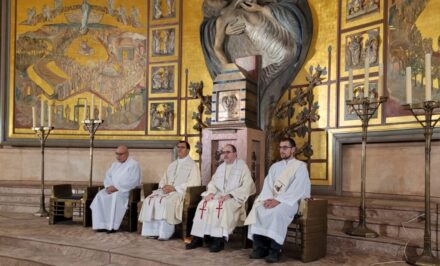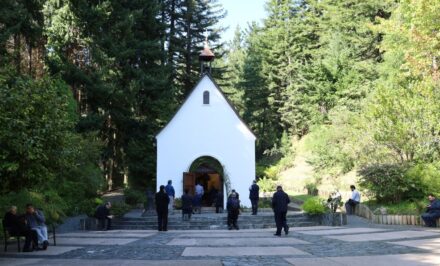SPAIN, Narcís Vidal, from the Apostolic Movement of Schoenstatt, Tarragona •
A few days ago, I was invited by the diocese to participate in a congress for the laity in Madrid with a main theme: “The First Announcement”. —
I must confess that my expectations were very low because of the reality around me. Accustomed to lectures full of ideas and desires where one then has the impression that it can come to nothing, or what is even worse, with rigid and strict concepts where one can hardly see the way to reach the heart of the neighbor.
From what we were told, this congress followed a previous one held in 2020, also in Madrid, where more than seven thousand people participated. At that congress it was identified that the first priority for the Church was “The First Announcement”. Of course, I asked participants of the previous congress, and they told me that it was interesting, but then it did not materialize in concrete actions.
With all this in my heart I went to Madrid putting this weekend in the hands of the Holy Spirit to surprise me. And He did.
We are lay people by vocation
Just to get there we met more than seven hundred lay people, consecrated and priests from all over Spain. And in it I heard something that indicated to me that something special was being generated in our Church: “We are not laity by omission, for not having decided to be priests, monks or consecrated. We are laity by vocation”. I must say that these words began to burn in my heart. I felt that we are not second-rate Christians, and that at this moment the Church needs us more than ever.
A team of lay people who have abandoned their professional tasks to devote themselves entirely to the Lay Advisory Council, have been working hard so that the ideas of the first congress could have a continuity, and even, in many places, could become a reality. This congress was therefore already a congress of shared realities, where humility, respect for others, creativity, and the acceptance that there are no specific recipes were words that were continually used.
“Do you really have openness and willingness to change?”
I must say that, because of my profession, used to change management in companies, I was beginning to feel that the language in which it was spoken was very familiar to me. It was a mix between two dimensions, but both equally important: on the one hand, prayer and discernment to the Holy Spirit to find what is the vision of the parish in its reality and how to accompany each one in an original and unique way, and on the other hand the systematic management and use of the talents of all those who make up the Church (artists, accountants, engineers, planners and managers …).
And all this, because all lay people understand that the top priority of our times for the Church is the “First Announcement”. It is about reorienting the realities we see in the parishes where we are satisfied with fulfilling the sacraments and precepts, to generate community life, welcoming and accompaniment.
The Holy Father tells us that “as Church we are communion, and what evangelizes the most is communion”. But this does not happen overnight. Curiously, I came across an exciting initiative that left me speechless. At the University of Valencia, a study was carried out on evangelizing parishes in Spain (UCV Faculty of Theology San Vicente Ferrer). You can find more information at https://proyectoparroquias.com/ (in Spanish).
This study has evaluated what the most evangelizing parishes have done and how they have carried it out. And this study is available to the whole Church. My question was, “How can it be that we’re not using it?” In the business world, when something is good and works, you must learn from it.
I loved the transparency that was shown in sharing the first question a parish is asked. That question was not what resources they have, nor whether they have the capabilities necessary for change. The question was simply: “Are you really open and willing to change?” Difficult question for everyone, but so important to be able to open the heart to the will of the Spirit.
And we spent the whole weekend talking about the first proclamation: the moment in which we can be instruments of God so that the other feels that God loves him, that he is his beloved child.
Being instruments of the first announcement
The congress made us aware of the importance of the first announcement and that it required a great deal of humility, trust and openness, creativity, and originality.
How many opportunities we have to be instruments of the first proclamation: in our daily lives, people who come to parishes to ask for a sacrament, in retreats of impact such as Emmaus and Effetá. I am certainly aware of how they work. But then what?
It is at this point that we must be more aware of the gentleness required by the soul of the other before the Announcement he or she has just received.
The testimony of different parishes showed me that systematics is not incompatible with charity. Some of them had developed individualized accompaniment processes, with specifically trained counselors and accompaniers, so that each newly announced person could be offered personalized accompaniment and community according to his or her reality. These will then allow them to walk towards the sacraments and the Church.
How many people we know who believe that the recipe that was good for them is the one to be followed by others. We were also able to see a little theater where we could visualize the roles of two companions: one humble, patient, creative, empathetic, but always close. The other impatient, with the right time and a rigid recipe of what the other should do. How easy it is sometimes to see ourselves reflected in both of them in different situations.
“We not only evangelize, but we are also evangelized”
Returning to the “First Announcement,” we were able to reflect on how often this situation occurs in our lives. How important it is for us to be aware of it and above all how important to also see the “First Announcement” in the person we are accompanying, because God is also in them.
“One does not begin to be a Christian by an ethical decision or a great idea, but by an encounter with an event, with a Person.”
“Every Christian is a missionary to the extent that he or she has encountered the love of God in Christ Jesus.”
To be able to be an instrument of God in the “First Announcement” something fundamental must be present in us first: to have had a profound and intense experience of God in our lives.
That is why I have decided to title this article “A heart full of hope: “First Announcement”, because that is how I came back from Madrid. With the joy of one who knows that the new evangelization is underway. It is possible that I am not yet seeing it in my diocesan reality, but it is underway. With parishes that have humbly opened themselves to change, and with lay people on the front line dedicating their time to being living instruments of God.
Schoenstatt DelegationOriginal: Spanish. Translation: Maria Fischer @schoenstatt.org


